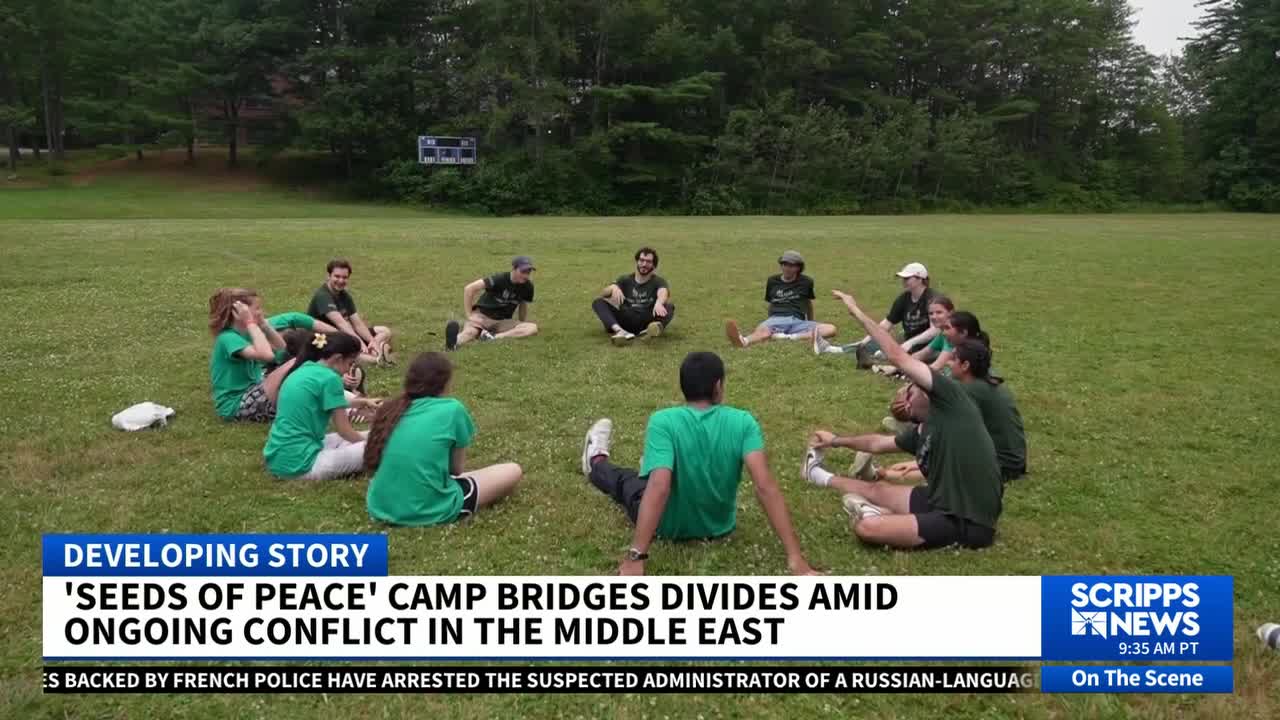Much of the world's conflict zones can seem thousands of miles away from the U.S., but not at one summer camp in Maine.
For decades now, the Seeds of Peace Camp has brought together teens from conflict zones, including Israelis and Palestinians. Since the start of the Israel-Gaza war, their work has perhaps never been harder, or more crucial.
Scripps News got rare access to the camp.
It's an overcast day at the Seeds of Peace summer camp in coastal Maine. There are outdoor sports, indoor activities, and more importantly for these teenagers — food. However, behind the typical scenes of teens at play lie very real, adult-world problems.
"All Palestinians suffered during this war," said Selena, a Palestinian Seeds of Peace camper.
"My father lost in Gaza a really good friend," added Shalom, an Israeli camper.
"Bombings everywhere, hospital is bombed," said Rania, another Palestinian camper.
IN RELATED NEWS | Over 100 aid agencies warn Gaza is on brink of starvation, push for more food access
"For all of us, there were people we knew that died, that got injured, that are traumatized, that are hostages," noted Ruth, an Israeli camper.
Israelis Ruth and Shalom, and Palestinians Selena and Rania, are just a few of the nearly 90 campers there. They are part of a legacy that began in 1993, when the nonprofit Seeds of Peace first started bringing Israeli and Palestinian teenagers to the U.S. for a summer camp.
"This is like any ordinary summer camp that you've ever probably experienced," said Seeds of Peace Executive Director Eva Armour. "What makes it unique is that for two hours a day, they have facilitated dialogue sessions — and that's led by professionals."
The dialogue sessions split the campers into smaller groups and are off-limits to everyone except the teenagers and the facilitators.
"We keep saying that, 'What happens in dialogue, stays in dialogue,'" said Jonathan Hefetz, a Seeds of Peace alum, who now works for the group. "But I think that the piece of that is really different in dialogue is basically challenging a lot of things that you don't challenge back home. And, all of a sudden here, they have the freedom to express themselves."
Seventeen-year-old Selena, who was born in the West Bank, said the way the dialogue sessions are structured makes them valuable to the campers.
"I would say it got heated sometimes — but one thing that is done with our dialogue groups is, the first day when we begin, we lay out some like dialogue norms, some things that some rules that we would like to go by," Selena said. "So, even if it does get heated, people do stay like respectful."
IN CASE YOU MISSED IT | Trump’s hostage envoy outlines mission in interview with Scripps News
It's not always easy for 15-year-old Shalom, a first-time camper from Jerusalem.
"Dialogue is very difficult for me, especially because I think society really wants you to learn like there you have an enemy and it's really hard to come over and just talk," Shalom said. "So, have to share through personal experience, which could be they're triggering or really difficult sometimes, but that's, in my opinion, the way to people, hearts and souls."
There is a before and after here, with the October 7, 2023, Hamas attack on Israel serving as a demarcation line of sorts. Sixteen-year-old Ruth from Israel, who first came to the Seeds of Peace Camp before the war, sees the changes.
"To compare what happened before and after is like heaven and earth," Ruth said. "Dialogue was very different, but I felt the reason that it was really important for me to come back is because after October 7, it didn't make me stop believing in peace."
For some of the campers, just getting there was a challenge. Seventeen-year-old Rania from Gaza managed to flee the war with her family during a very brief time when the Rafah border crossing with Egypt was open in late 2023.
"People around the world were living there normally and I was hungry. I was scared," Rania said. "My home is there. It's destroyed and burned, but all of my stuff is inside. I came to Egypt with nothing."
RELATED STORY | 73 people killed waiting for humanitarian aid across Gaza, Palestinian Health Ministry says
When asked what it is like to be at the camp, Rania reflected on what she was looking to gain from the experience.
"I'm here to learn from other people's perspective, to share what I think. And I don't need someone to be convinced. I just need respect, and I respect what other people think," Rania said.
Seeds of Peace Executive Director Armour said the discussions among the campers there help make the camp stand out.
"This isn't about kids in canoes just — or on soccer fields," Armour said. "There is a deep, powerful presence that happens through those experiences, where people have those chances to connect."
There are no cell phones at the camp and no television. The idea is to keep outside influences — like social media or the news — away from the campers while they are there.
Later this month, the campers will head home. Counselors say it can take the campers up to a year to process what they experienced at Seeds of Peace and merge it with everything happening back home.
In addition to Israelis and Palestinians, there are also teenagers at the camp from India and Pakistan — two nuclear powers that have had a fraught history. Both countries exchanged gunfire as recently as this past April over the disputed Kashmir region.
Seeds of Peace has expanded to include those countries as well, as they work on other parts of the world where teenagers are also growing up in conflict zones.





